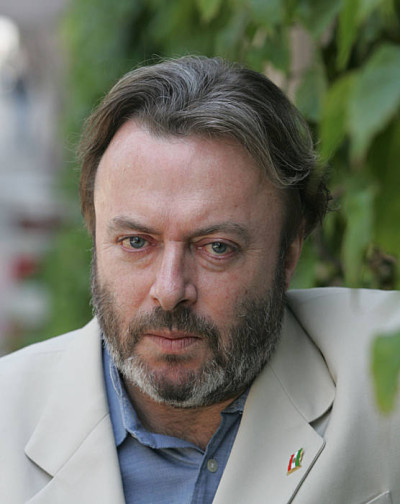Christopher Hitchens (Christopher Hitchens)

Christopher Eric Hitchens (13 April 1949 – 15 December 2011) was a British American author, philosopher, polemicist, debater, and journalist. He contributed to New Statesman, The Nation, The Atlantic, The London Review of Books, The Times Literary Supplement and Vanity Fair. Hitchens was the author, co-author, editor and co-editor of over thirty books, including five collections of essays, and concentrated on a range of subjects, including politics, literature and religion. A staple of talk shows and lecture circuits, his confrontational style of debate made him both a lauded and controversial figure. Known for his contrarian stance on a number of issues, Hitchens excoriated such public figures as Mother Teresa; Bill Clinton; Henry Kissinger; Diana, Princess of Wales; and Pope Benedict XVI. He was the elder brother of author Peter Hitchens.
Long describing himself as a socialist and a Marxist, Hitchens began his break from the established political left after what he called the “tepid reaction” of the Western left to the Rushdie Affair, followed by the left’s embrace of Bill Clinton, and the “anti-war” movement’s opposition to intervention in Bosnia-Herzegovina—though Hitchens did not leave his position writing for The Nation until post-9/11, stating that he felt the magazine had arrived at a position “that John Ashcroft is a greater menace than Osama bin Laden.” The September 11 attacks “exhilarated” him, bringing into focus “a battle between everything I love and everything I hate,” and strengthening his embrace of an interventionist foreign policy which challenged “fascism with an Islamic face”. His numerous editorials in support of the Iraq War caused some to label him a neoconservative, although Hitchens insisted he was not “a conservative of any kind”, and his friend Ian McEwan described him as representing the anti-totalitarian left. Indeed, in a 2010 BBC interview, he stated that he was “still a Marxist”.
A noted critic of religion and an antitheist, he said that a person “could be an atheist and wish that belief in god were correct”, but that “an antitheist, a term I’m trying to get into circulation, is someone who is relieved that there’s no evidence for such an assertion”. According to Hitchens, the concept of a god or a supreme being is a totalitarian belief that destroys individual freedom, and that free expression and scientific discovery should replace religion as a means of teaching ethics and defining human civilisation. His anti-religion polemic, New York Times Bestseller, God is not Great: How Religion Poisons Everything, sold over 500,000 copies.
Hitchens died on 15 December 2011 from complications arising from esophageal cancer, a disease that he acknowledged was more than likely due to his lifelong predilection for heavy smoking and drinking.
Born
- April, 13, 1949
- Portsmouth, Hampshire, England
Died
- December, 15, 2011
- USA
- Houston, Texas
Other
- Body donated to medical science


